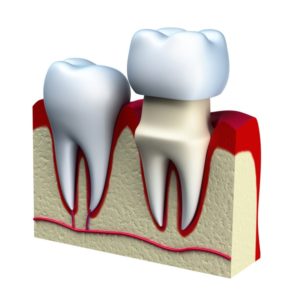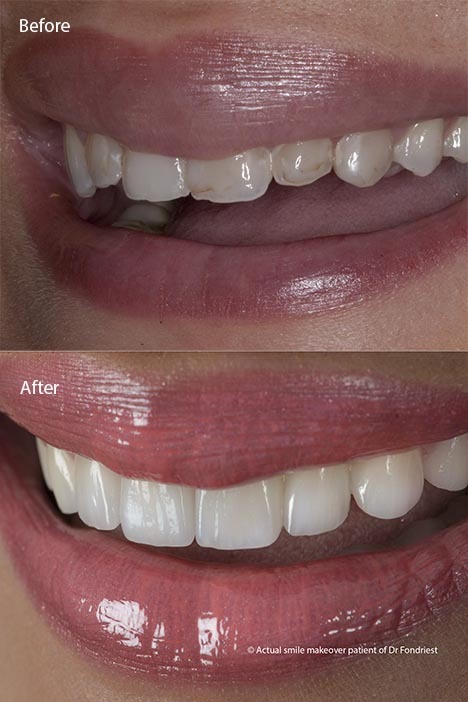
We are often asked by patients, “why can’t I have a bigger filling?” When old fillings break, your dentist will evaluate how much of the original tooth remains. Usually, if 50% or less remains, a crown (also called a cap) is recommended. This article explores in more detail the many reasons for crowns.
Despite our best intentions, accidents and dental problems happen. The effects of dental cavities grow over decades. Even careful brushing twice and day and regular flossing can not always prevent small cavities from forming. Luckily, even advanced dental problems can often be fixed using custom teeth crowns designed and placed by your dentist. A crown is a unique option that delivers restorative and cosmetic benefits. The porcelain cap will fully encase your tooth to deliver protection and natural results.
No matter what reason you have for needing a crown, your dentist can restore form to your smile using this great restoration. Here are several reasons why you may need one.
Having a root canal is often a reason for getting a crown
Teeth crowns are commonly placed following treatment for a root canal infection. The inner space of your tooth contains nerves, blood vessels, and soft areas that can easily become infected. An infection can reach the root canals if an older cavity is not treated. This dental problem can also result from old fillings that have become loose or an injury.
Following your root canal treatment, you can be fitted with a cap that restores strength to your tooth and prevents the return of the infection. The option is used when a large filling will not work as well.
 Advanced tooth decay can be repaired with dental caps
Advanced tooth decay can be repaired with dental caps
Over time, decay can erode the enamel of your tooth, which can lead to oral pain and heightened sensitivity. To relieve discomfort and preserve what remains of the damaged tooth, your dentist decides that he/she has a reason for a crown.
First, the dentist prepares the tooth by removing any decay or old filling materials. Then the outer layer of your tooth is reduced using a special drill. The procedure is performed using local anesthesia so you remain comfortable at all times.
To restore lost enamel, you can be fitted with durable caps that look natural. There is an adjustment period associated with the days following the placement of your crown or temporary crown, but most patients will enjoy immediate relief from discomfort once decay has been removed and the crown is ready.
Dental Bridge
A traditional dental bridge is supported by two crowns (one on each side of the row of false teeth). The supporting teeth are called abutment teeth, and the false teeth are called pontic teeth. To be eligible to receive a dental bridge, patients should have two healthy teeth on either side of the gap in their smile.
After the teeth are prepped, natural looking caps can be placed to support the pontic teeth. Dr. Fondriest can also place a dental bridge following implant placement. Implants are metal posts that are placed in the jaw.
Implants offer additional benefits. The metal posts promote bone regeneration in your jaw. If you are missing teeth, the loss of bone in your jaw can cause your cheeks to not look full. Having strong jawbones is important to ensure that your implants last a lifetime.
A bridge that is supported by implants offers superior stability. Dr. Fondriest will be glad to explain the pros and cons of a traditional bridge vs an implant supported bridge. Many of our patients report that an implant feels just like their natural teeth.
 Cosmetic uses and reasons for crowns
Cosmetic uses and reasons for crowns
A crown can address many of the cosmetic issues that a veneer can. If you have a tooth that is small, misshapen, chipped, gapped, or significantly discolored, Dr. Fondriest can have the blemished tooth encased in an attractive cap that restores beauty to your smile.
Veneers are placed for purely cosmetic reasons while teeth crowns can serve restorative and cosmetic purposes. Dental caps can address teeth that are:
- Small
- Misshapen
- Chipped cracked
- Worn
- Discolored
The porcelain caps are highly durable, meaning that they can last several years longer than a veneer. Some people are unsure which option will meet their personal and cosmetic goals. Our doctor can recommend the perfect treatment option.
Restorative Reasons for Crowns
When a tooth becomes compromised, dentistry is used to restore strength. There are many reasons why you may need a crown. A dental crown can protect a tooth that has experienced a significant crack. Often the permanent crown can be done instead of extracting the tooth.
A worn tooth can leave patients with uncomfortable sensitivity. This can make eating hot or cold food and drinks uncomfortable or even painful. Patients will need to address grinding before undergoing dental crown placement. Often, a special mouthguard is all that is needed to prevent damage from nighttime grinding.
Caps are also used when a filling, inlay, or onlay is not adequate.
Dental Implants
An implant is a metal post that is surgically placed in the jaw. While the implant can stay in your bone and make it stronger, it does not offer anything to chew with. Getting an implant is always a reason for a crown. A special device called an abutment holds the cap in place. A completely artificial tooth is placed over the implant.
Implants offer better stability compared to traditional restorations. The implant also prevents the loss of bone mass, which can leave individuals looking several years older than they actually are.
Maintaining your dental work
Keeping good oral hygiene habits and visiting your dentist twice a year for cleanings and exams is important. It can ensure that your restoration lasts for 10 or more years. While teeth crowns are highly durable, the underlying tooth and supportive natural parts of your mouth (gums, jawbone) need to remain healthy and free of disease.
You should also keep the visible portion of your crown clean. Gum disease can lead to tissue issues that expose the base of your crowns, for example. Keeping a healthy gum line can ensure that your porcelain fused to metal crown never shows a dark line.
Tips for maintaining healthy gum tissue include:
- Flossing daily
- Brushing twice a day
- Undergoing professional cleanings regularly
- Using a therapeutic mouthwash
- Investing in an electric toothbrush
Your doctor will ensure that your dentistry is still healthy during your visit. You should never use your dentistry to bite or tear objects or other things.
Learn more about the many reasons for and types of crowns available
Natural looking caps can serve a wide range of purposes. Dr. Fondriest works with other top dental and medical experts as well as a great dental laboratory. We offer our clients the best possible treatment outcomes available in dentistry today.
Learn more about the benefits of this dental crown procedure. Call our office at (847) 234-0517.

 Cosmetic uses and reasons for crowns
Cosmetic uses and reasons for crowns